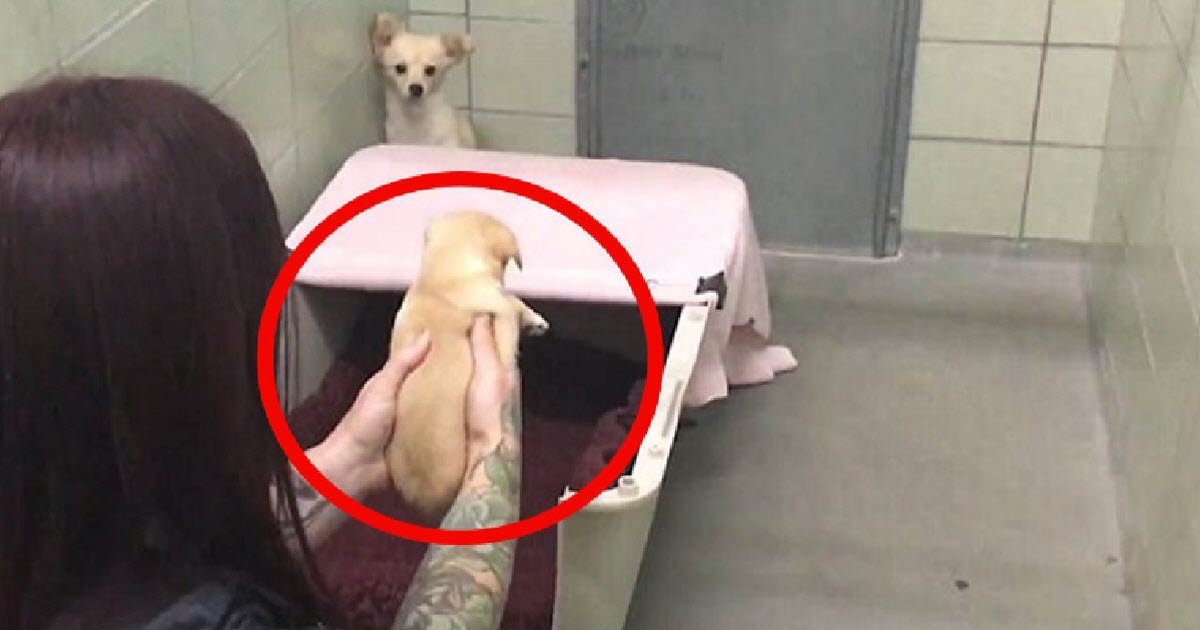Can dogs have braces? This question has sparked curiosity among pet owners seeking to improve their dogs’ oral health. While it may seem unusual, orthodontic treatment for dogs is a valid option in some cases. In this article, I will explore the possibility of dogs having braces and discuss the importance of dog dental care.
Key Takeaways:
- Dogs can receive orthodontic treatment in the form of braces to address dental issues.
- Dog dental care is essential for maintaining overall oral health.
- Orthodontic treatment for dogs can improve oral function and appearance.
- Consulting with a veterinarian is crucial to determine the best treatment approach for your dog.
- Regular dental care and a balanced diet contribute to maintaining good oral health in dogs.
Understanding Canine Dental Problems
Dog dental care plays a vital role in maintaining their overall oral health. Just like humans, dogs can experience dental problems such as misaligned teeth or bite issues. These issues can cause discomfort, difficulty eating, and even lead to oral diseases if left untreated. That’s where canine braces, also known as orthodontic treatment for dogs, come into play.
Canine braces aim to address dental problems in dogs by correcting misalignments and improving teeth alignment. By doing so, they can alleviate pain, enable proper chewing and eating, and prevent the development of oral diseases. These braces not only contribute to better oral health but can also enhance a dog’s overall appearance, giving them a brighter smile.
To understand canine dental problems better, it’s essential to consider the following aspects:
- The importance of dog dental care
- Common dental issues in dogs such as misaligned teeth and bite problems
- The role of canine braces in treating these issues and improving dog oral health
By gaining a deeper understanding of canine dental problems, we can provide our furry friends with the necessary care and treatment to ensure their oral health and overall well-being.
The Benefits of Dog Braces
Braces for dogs offer a range of benefits that go beyond just improving their appearance. They play a crucial role in enhancing dog oral health and overall well-being. By correcting misalignments and bite issues, braces can alleviate pain and discomfort, enabling proper chewing and eating.
Furthermore, braces for dog teeth can prevent oral diseases that may arise from dental problems. The alignment of teeth achieved through orthodontic treatment promotes better oral hygiene by allowing easier plaque removal and reducing the risk of periodontal disease.
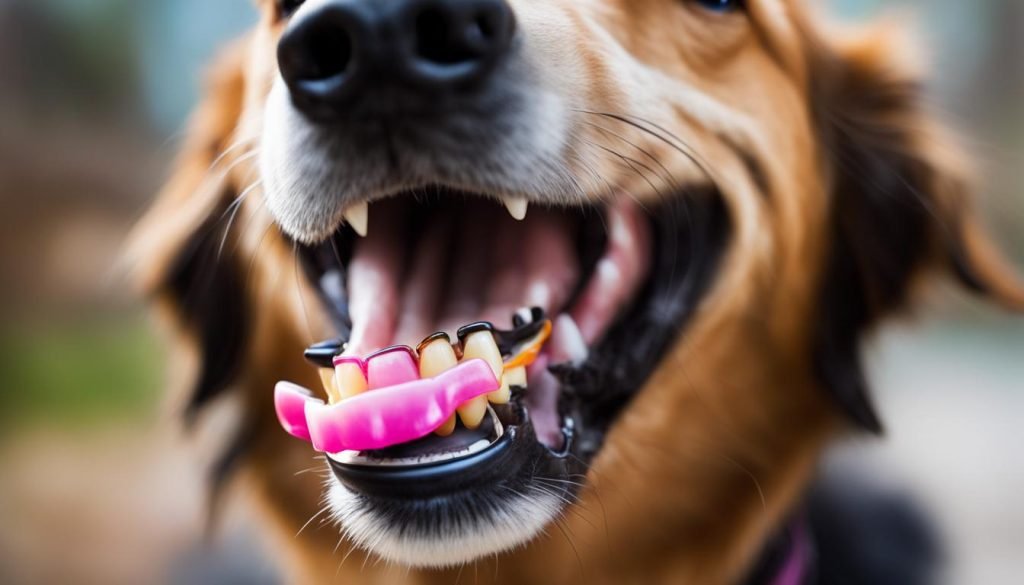
Aside from the oral health benefits, dog braces can also boost a dog’s confidence and quality of life. Dogs with dental issues may experience challenges in social interactions and may struggle with activities such as playing with toys or chewing bones. By improving their dental health, braces can contribute to a happier and more comfortable life for dogs.
Key Benefits of Dog Braces:
- Improved oral health and hygiene
- Alleviation of pain and discomfort
- Enhanced chewing and eating abilities
- Prevention of oral diseases
- Boosted confidence and quality of life
| Benefit | Description |
|---|---|
| Improved oral health and hygiene | Braces correct misalignments and bite issues, allowing for easier plaque removal and reducing the risk of periodontal disease. |
| Alleviation of pain and discomfort | By addressing dental problems, braces can relieve pain and discomfort associated with misaligned teeth or bite issues. |
| Enhanced chewing and eating abilities | Proper teeth alignment achieved through braces enables dogs to chew and eat food more efficiently. |
| Prevention of oral diseases | Orthodontic treatment helps prevent oral diseases that may arise from dental problems, promoting better long-term oral health. |
| Boosted confidence and quality of life | Improved dental health can contribute to a dog’s overall well-being, boosting their confidence and enhancing their quality of life. |
When Are Dog Braces Recommended?
Orthodontic treatment for dogs, including dental braces, is recommended in specific cases where dental problems significantly impact a dog’s quality of life. These problems may involve misaligned teeth, overcrowding, bite issues, or orthodontic abnormalities. Only a qualified veterinarian can assess the dog’s oral condition and determine whether braces are the appropriate treatment option.
Examining the dog’s dental health through professional expertise is crucial when considering orthodontic treatment. The veterinarian will conduct a thorough examination, which may include X-rays, observations, and measurements. This evaluation helps identify the severity of the dental issues and whether braces can effectively address them.
It is important to note that not all dogs require braces. Orthodontic treatment is generally recommended for dogs that experience significant oral discomfort, difficulty eating, or other functional issues. Veterinary guidance is essential to ensure the best course of action for your dog’s oral health and overall well-being.
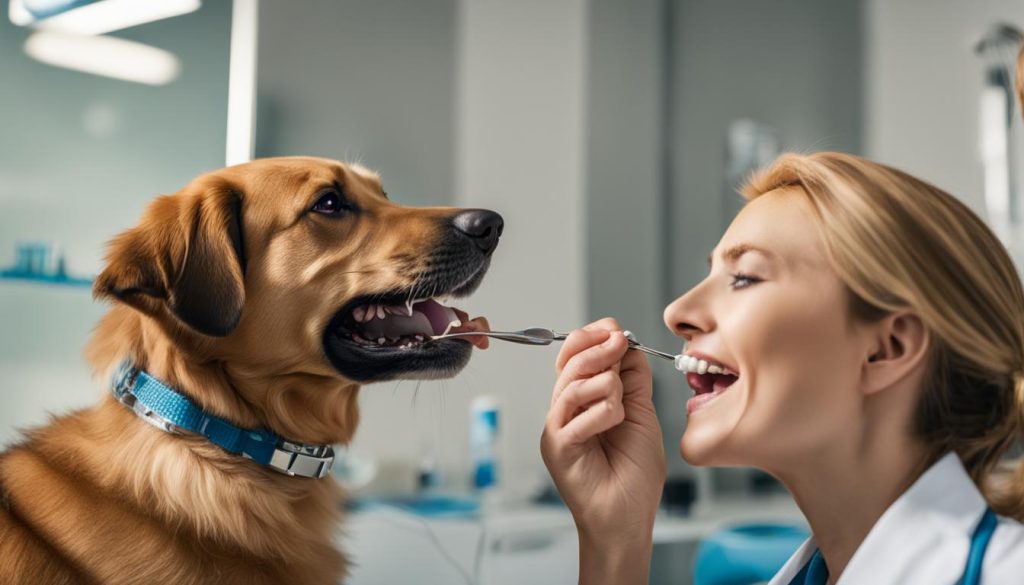
| Conditions | Recommendation |
|---|---|
| Misaligned Teeth | Braces can help correct the alignment, improving oral health and function. |
| Crowding | Braces can alleviate discomfort caused by overcrowded teeth and create space for proper alignment. |
| Bite Issues | Braces can address bite problems, ensuring proper jaw alignment and reducing discomfort. |
| Orthodontic Abnormalities | Braces may be recommended to correct irregularities and improve overall dental health. |
Remember, consulting with a veterinarian is essential when considering orthodontic treatment for your dog. They will provide a comprehensive assessment and guide you on the most appropriate treatment options for your furry friend’s oral health needs.
Types of Dog Braces
When considering orthodontic treatment for dogs, there are various types of braces to choose from. Each type has its unique features and benefits, catering to different dental conditions and preferences. Here are the three main types of dog braces commonly used:
1. Traditional Braces
Traditional braces for dogs consist of brackets and wires that are attached to the dog’s teeth. These braces apply gentle pressure to gradually shift the teeth into the desired position. This type of braces is effective for correcting misalignments, bite issues, and other orthodontic abnormalities. Traditional braces are a popular choice for dogs with moderate to severe dental problems.
2. Clear Aligners
Clear aligners offer a more discreet option for orthodontic treatment in dogs. Similar to clear aligners used in humans, these transparent trays are custom-made to fit the dog’s teeth. Clear aligners gradually shift the teeth into proper alignment over time. This type of braces is ideal for dogs with mild dental issues and pet owners who prefer a less visible treatment option.
3. Lingual Braces
Lingual braces are another alternative for dogs requiring orthodontic treatment. These braces are placed on the inner side of the teeth, making them less noticeable. Lingual braces work similarly to traditional braces but provide a more aesthetically pleasing outcome. They are suitable for dogs with various dental conditions, depending on the specific needs identified by a veterinarian.
It is important to consult with a veterinarian to determine the most appropriate type of braces for your dog. The choice will depend on factors such as the severity of the dental problem, the dog’s comfort level, and your preferences as a pet owner. By selecting the right type of braces, you can ensure that your dog receives the necessary orthodontic treatment for optimal oral health.
The Importance of Veterinary Guidance
When considering orthodontic treatment for dogs, it is crucial to seek veterinary guidance. Veterinarians play a crucial role in assessing a dog’s oral health, determining the need for braces, and providing guidance on the best treatment approach. Their expertise and experience ensure the safety and effectiveness of orthodontic treatment in dogs.
Veterinarians will carefully evaluate the dog’s oral condition to determine if braces are necessary. They will take into account factors such as misaligned teeth, crowding, bite issues, or other orthodontic abnormalities that may affect the dog’s quality of life. By consulting with a veterinarian, pet owners can make informed decisions about their dog’s oral health and receive the most suitable treatment recommendations.
Orthodontic treatment for dogs should never be attempted without professional guidance. Veterinarians have the knowledge and training to evaluate the overall health of the dog’s teeth, gums, and jaw structure. They can identify any underlying issues that may need to be addressed prior to orthodontic treatment. Additionally, veterinarians can provide valuable post-treatment care instructions to ensure the long-term success of the braces.
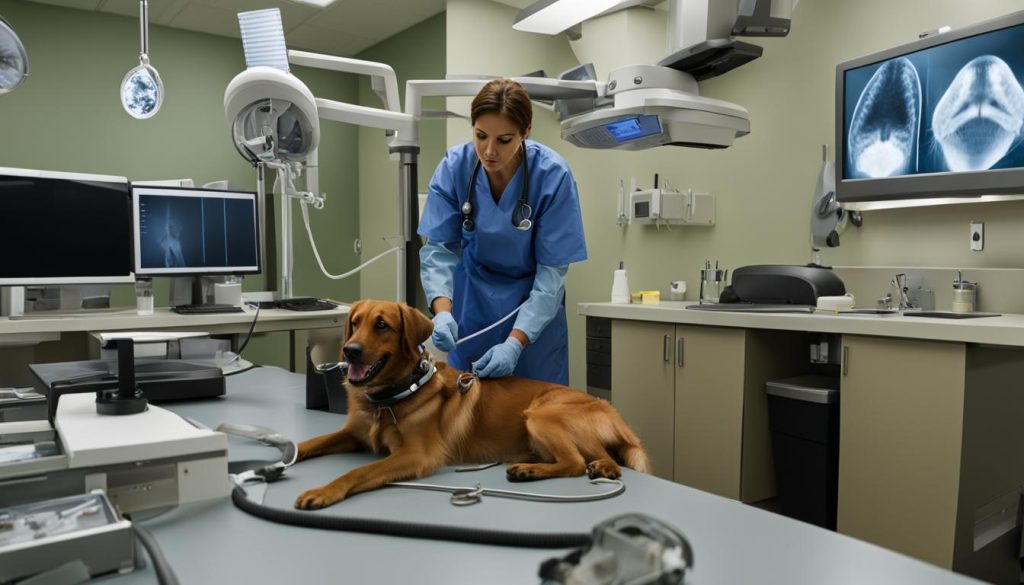
Overall, the importance of veterinary guidance cannot be overstated when it comes to orthodontic treatment for dogs. By working hand in hand with a veterinarian, pet owners can ensure the best possible outcome for their furry friend’s oral health.
Common Misconceptions About Dog Braces
There are some common misconceptions about dog braces that need to be addressed. One of the most prevalent misconceptions is that dog braces are purely cosmetic, with no functional purpose. However, this couldn’t be further from the truth. While braces can indeed enhance a dog’s appearance, their primary goal is to improve the dog’s oral health and address dental issues. Braces for dogs can correct misaligned teeth, bite problems, and other orthodontic abnormalities, which can alleviate pain, enable proper chewing and eating, and prevent oral diseases.
Another misconception is that dog braces are only suitable for certain breeds. In reality, any dog with dental problems can benefit from orthodontic treatment. Whether it’s a small breed, a large breed, or a mixed breed, if a dog experiences dental issues that affect their quality of life, braces can be a viable option to improve their oral health and overall well-being.
It is important to consult with a veterinarian to determine the best course of action for your dog’s oral health. A veterinarian will assess your dog’s dental condition, recommend whether orthodontic treatment is necessary, and guide you through the process of getting braces for your dog if it is deemed appropriate. Their expertise and experience will ensure the safety and effectiveness of the treatment, providing your furry friend with the best possible care.
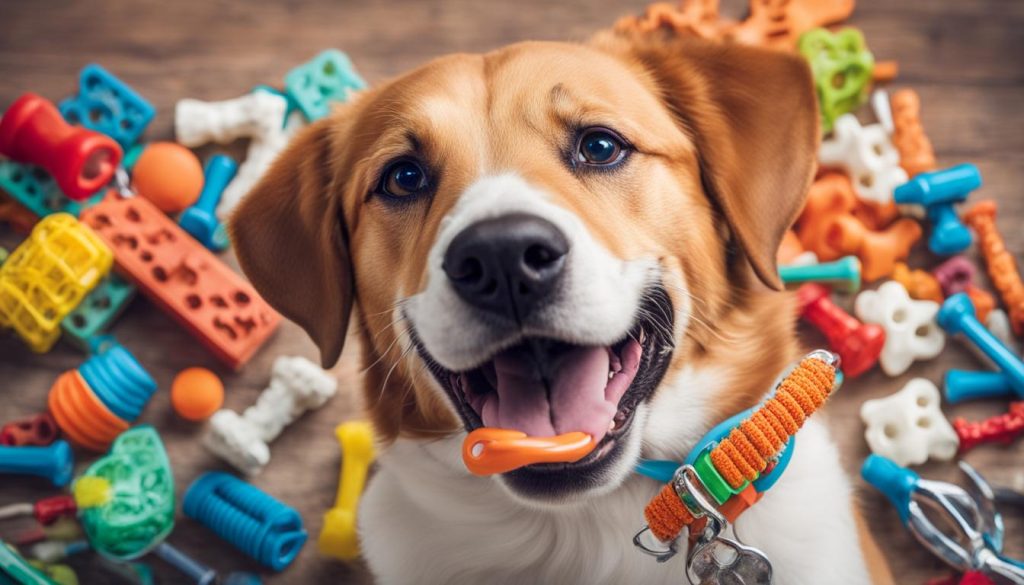
Alternatives to Dog Braces
While dog braces are an effective treatment option for dental issues in dogs, there are alternative approaches that pet owners can consider. These alternatives are suitable for cases where braces may not be necessary or feasible. It is important to consult with a veterinarian to determine the most suitable option for your dog’s needs.
Dental Cleaning
Regular dental cleaning is an essential part of dog dental care. Professional cleanings can help remove plaque and tartar buildup, which can contribute to dental problems. During a dental cleaning, a veterinarian will thoroughly clean your dog’s teeth and gums, helping to maintain good oral health. This can be a viable alternative to braces in cases where the primary concern is plaque and tartar buildup rather than misalignment or bite issues.
Extractions
In some cases, extraction of problematic teeth may be a suitable alternative to dog braces. This is often recommended when a tooth is severely decayed, damaged, or causing other dental problems. Extracting the affected tooth can alleviate pain and prevent further complications. A veterinarian will assess the situation and determine whether extractions are necessary for your dog’s oral health.
| Treatment Option | Description |
|---|---|
| Dental Cleaning | Regular professional cleaning to remove plaque and tartar buildup |
| Extractions | Removal of problematic teeth to alleviate pain and prevent further complications |
Other Dental Procedures
In addition to dental cleaning and extractions, there are other dental procedures that can address specific dental issues in dogs. These may include root canal treatment, periodontal therapy, or restorative dentistry. A veterinarian will assess your dog’s condition and recommend the most appropriate dental procedure to resolve their specific dental problems.
It’s important to remember that every dog is unique, and what works for one may not be suitable for another. Consulting with a veterinarian will help determine the most appropriate treatment option for your dog’s dental care needs.
Maintaining Dog Oral Health
When it comes to the oral health of our furry friends, regular care is essential. Just like humans, dogs can develop dental problems that can cause discomfort and affect overall health. To ensure your dog’s oral health remains in top shape, here are some important steps to follow:
1. Regular Brushing:
Brushing your dog’s teeth regularly is one of the most effective ways to maintain good oral hygiene. Use a toothbrush and toothpaste specifically designed for dogs, as human products can be harmful to them. Start slowly and gradually increase the duration of brushing sessions. Aim for at least two to three times a week to keep plaque and tartar buildup at bay.
2. Dental Cleanings:
In addition to regular brushing, professional dental cleanings are vital to your dog’s oral health. Schedule regular check-ups with your veterinarian to have your dog’s teeth professionally cleaned. This will help remove stubborn plaque and tartar, preventing the development of gum disease and other dental issues.
3. Chewing Toys and Dental Treats:
Providing your dog with appropriate chewing toys and dental treats can contribute to their oral health. Chewing helps stimulate saliva production, which can naturally clean the teeth and reduce plaque buildup. Look for dental-specific toys and treats that are designed to promote dental health.
4. Regular Monitoring:
Keep an eye out for any signs of dental problems in your dog. This includes bad breath, excessive drooling, swollen gums, bleeding, or difficulty eating. If you notice any of these symptoms, it’s important to seek veterinary care promptly. Early detection and treatment can prevent further complications and ensure your dog’s oral health remains in good condition.
| Dental Care Tips for Dogs | |
|---|---|
| 1 | Regularly brush your dog’s teeth with dog-specific toothpaste and toothbrush. |
| 2 | Schedule regular professional dental cleanings with your veterinarian. |
| 3 | Provide your dog with dental-specific chewing toys and treats. |
| 4 | Monitor your dog’s oral health and seek veterinary care if any issues arise. |
By following these steps and maintaining regular dental care for your dog, you can help promote their oral health and prevent potential dental problems. Remember, a healthy mouth leads to a happy and vibrant dog!
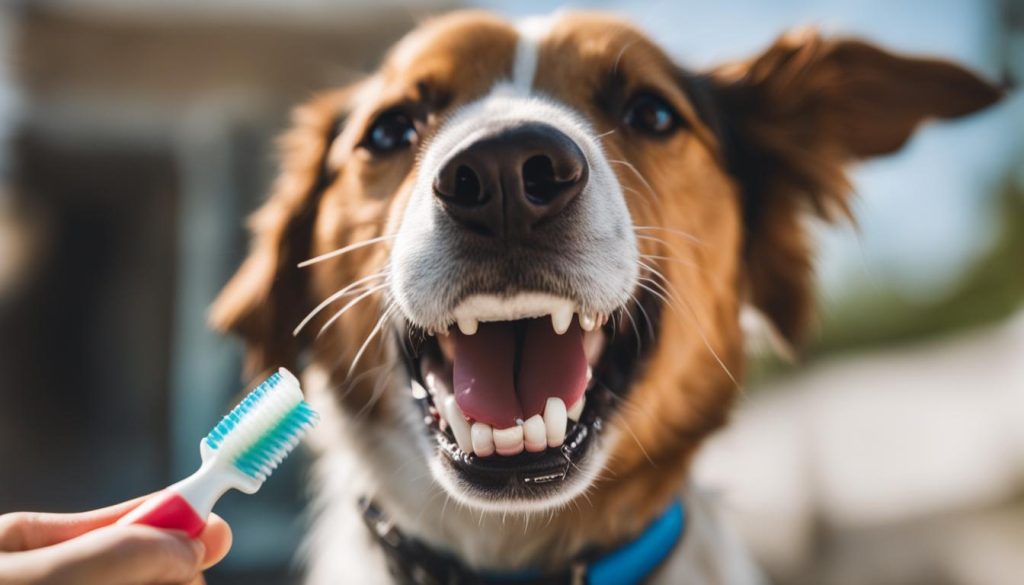
Exploring Homemade Dog Food Options
Dog dental care is an important aspect of maintaining their overall health and well-being. Along with regular brushing and dental cleanings, providing a balanced diet can significantly contribute to your dog’s oral health. Homemade dog food can be a nutritious option to consider, especially when addressing specific dental issues.
By preparing homemade dog food, you have control over the ingredients and can tailor the recipe to meet your dog’s specific needs. For example, incorporating foods that promote dental health, such as lean meats, crunchy vegetables, and chewy treats, can help keep your dog’s teeth clean and strong.
One delectable homemade dog food recipe for dental health is homemade beef stew for dogs. This recipe includes lean beef, carrots, green beans, and sweet potatoes. These ingredients provide essential nutrients while also offering dental benefits. The meat provides protein for muscle development, while the vegetables offer vitamins and minerals for overall health. The texture of the stew also provides a good chewing exercise, promoting dental hygiene.

It’s important to note that not all homemade dog food recipes are suitable for every dog, and consulting with a veterinarian is recommended. A veterinarian can guide you in creating balanced homemade meals that support your dog’s dental health and overall nutritional needs. They can also ensure you avoid any ingredients that may be harmful to dogs.
In summary, homemade dog food can be a beneficial option for promoting dental health in dogs. By incorporating ingredients that support dental hygiene, like lean meats and crunchy vegetables, you can help keep your dog’s teeth clean and strong. Remember to consult with a veterinarian to ensure the recipes you choose are suitable for your dog’s specific needs. Providing a balanced diet alongside regular dental care will contribute to your furry friend’s oral health and overall well-being.
Conclusion
In conclusion, dogs can indeed have braces as a means to improve their dental health and address dental issues such as misaligned teeth or bite problems. The field of orthodontic treatment for dogs offers several benefits, including improved oral function and a more pleasant appearance. However, it is crucial to consult with a veterinarian to determine the best treatment approach for your dog.
Alongside orthodontic treatment, it is essential to prioritize regular dental care for your furry friend. Just as humans need dental care to maintain oral health, so do dogs. This includes regular brushing, dental cleanings, and the use of appropriate chew toys. By incorporating these practices into your dog’s routine, you can help promote healthy teeth and gums.
Furthermore, providing a balanced diet is crucial for your dog’s overall health, including their dental well-being. While orthodontic treatment and dental care play significant roles, the importance of a nutritious diet cannot be understated. Homemade dog food can be a viable option, particularly when considering specific dental issues. Recipes like homemade beef stew for dogs can provide a tasty and healthy meal that supports dental health.
In summary, by seeking professional veterinary guidance, ensuring regular dental care, and maintaining a balanced diet, you can contribute to your dog’s excellent oral health and overall well-being. Remember, each dog is unique, and consulting with a veterinarian is essential to determine the best course of action for your beloved companion.
FAQ
Can dogs have braces?
Yes, dogs can have braces. Orthodontic treatment for dogs, also known as canine braces, is a valid option in some cases to address dental problems.
Why would a dog need braces?
Dogs may need braces if they have dental problems such as misaligned teeth or bite issues. Braces can improve their oral health and alleviate discomfort.
How do dog braces benefit oral health?
Dog braces can align teeth, improve oral function, alleviate pain, enable proper chewing and eating, and prevent oral diseases.
When are dog braces recommended?
Dog braces are recommended when dental problems affect a dog’s quality of life, such as misaligned teeth, crowding, bite issues, or orthodontic abnormalities.
What types of dog braces are available?
There are various types of dog braces, including traditional braces, clear aligners, and lingual braces. The recommended type will depend on the dog’s needs and condition.
Do all dogs with dental problems need braces?
Not all dogs with dental problems need braces. There are alternative treatments such as dental cleaning, extractions, and other dental procedures that may be recommended.
Is veterinary guidance necessary for dog braces?
Yes, it is important to seek veterinary guidance when considering dog braces. A veterinarian will assess the dog’s oral health and determine the best treatment approach.
Are dog braces only for certain breeds?
No, any dog with dental problems can benefit from orthodontic treatment, regardless of breed.
How can I maintain good oral health for my dog?
Regular brushing, dental cleanings, appropriate chew toys, and monitoring the dog’s oral health are essential for maintaining good oral health for dogs.
Can homemade dog food support dental health?
Yes, homemade dog food can be a nutritious option for dental health. Recipes like homemade beef stew for dogs can provide a tasty and healthy meal.





